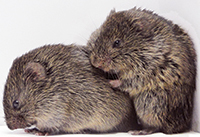Voles who console
What happens when a vole is upset? The vole equivalent of a hug.
 |
|
Prairie voles show an empathy-based consoling response—grooming—when other voles are distressed, found researchers at Yerkes National Primate Research Center. This is the first time consolation behavior has been observed in rodents, which contradicts the belief that empathy is uniquely human.
“Scientists have been reluctant to attribute empathy to animals, often assuming selfish motives,” says study coauthor Frans de Waal, director of Yerkes’ Living Links Center. “These explanations have never worked well for consolation behavior, however, which is why this study is so important.” Coauthors Larry Young, division chief of Behavioral Neuroscience and Psychiatric Disorders at Yerkes, and graduate student James Burkett demonstrated that oxytocin (a brain chemical responsible for maternal nurturing and social bonding) acts in a specific brain region of prairie voles, the same as in humans, to promote consoling, which is demonstrated through calming contact directed at a distressed animal. While primates might hug, voles groom the distressed animal. The prairie voles’ consoling behavior was strongest toward familiar voles.







